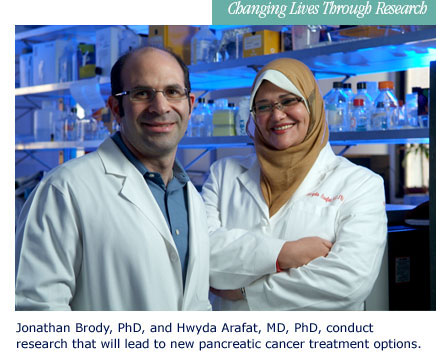
Article Title
Innovative Therapies for Pancreatic-Related Cancers
Recommended Citation
(2007)
"Innovative Therapies for Pancreatic-Related Cancers,"
Jefferson Surgical Solutions: Vol. 1:
Iss.
3, Article 5.
Available at:
https://jdc.jefferson.edu/jss/vol1/iss3/5
Included in
Pancreatic cancer patients come to Thomas Jefferson University Hospital because of the reputation, skill, and track records of its surgical staff, who perform a high volume of surgeries. However, this patient-centric approach to care is supported by an impressive research capability that also has significant impact on both the prevention and recovery of pancreatic-related diseases.
Two world-class Jefferson researchers, Hwyda Arafat, MD, PhD, and Jonathan Brody, PhD, are making tremendous inroads toward understanding the science and genesis of pancreatic-related cancers. Their goal is to manage or halt the progress of disease through innovative and diverse therapies.

Dr. Arafat, Assistant Professor of Surgery, has a PhD in cell biology and immunology. A native of Egypt, she is currently investigating pancreatic cancer as it pertains to the reninangiotensis system involved in hypertension. She is also interested in the use of antihypertension medications already on the market to help treat pancreatic cancer. "I have the patient on my mind everyday," she says. "It is my motivation, my hope that our research can help to make the disease manageable."
In 2005, when Dr. Arafat began a multidisciplinary approach in the lab that expanded her work on diabetes, she began to see correlations between patients who received hypertension medications and a decrease in cancer occurrences. "Clinical trials are just a year away that will help us understand whether the hypertension therapies work, as well as the science behind them," explains Dr. Arafat.
Since joining the Jefferson faculty as Assistant Professor in 2006, Dr. Brody has concentrated on the complex molecular genetics of pancreatic cancer. After earning a PhD from the Johns Hopkins School of Medicine, he completed post-doctoral training in oncology with Scott E. Kern, MD, who is world-renowned for his work in the genetics of pancreatic cancer. Together they revolutionized a basic molecular biology technique (now patented) called DNA electrophoresis, making it possible to see genetic results five times faster with cleaner results.
"Clinical trials are just a year away that will help us understand whether the hypertension therapies work, as well as the science behind them."
A patient's tumor is collected during surgery and then studied in the lab to understand its specific genetics. Dr. Brody seeks to use this information to develop anti-cancer therapies through medication that will be suited to the individual patient.
"By studying a tumor's genesis, we can begin to understand the series of events that led up to making a cell cancerous," he says. "We will then have isolated the molecular defects-what went wrong-and can find a better, more targeted, and sophisticated approach for drug therapies." Dr. Brody explained that, just as we now know which antibiotics work best for specific bacterial strains, "we are striving to do the same for pancreatic cancers, and we are already seeing some very positive results."
Doctors Arafat and Brody are at the forefront of research in the field today. Dr. Arafat was one of the Jefferson physicians to represent Jefferson at the distinguished 2006 Southern Surgical Association Meeting in Florida last November, where she presented some of her recent findings. It is their goal to leverage this work in the lab to ensure that patients survive pancreatic cancer in increasing numbers and go on to live long and healthy lives.

